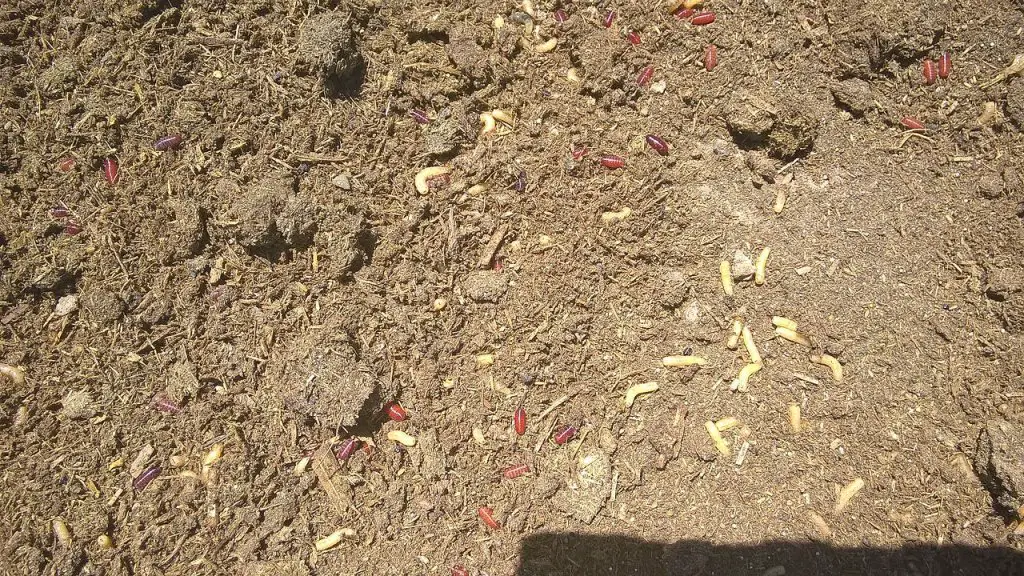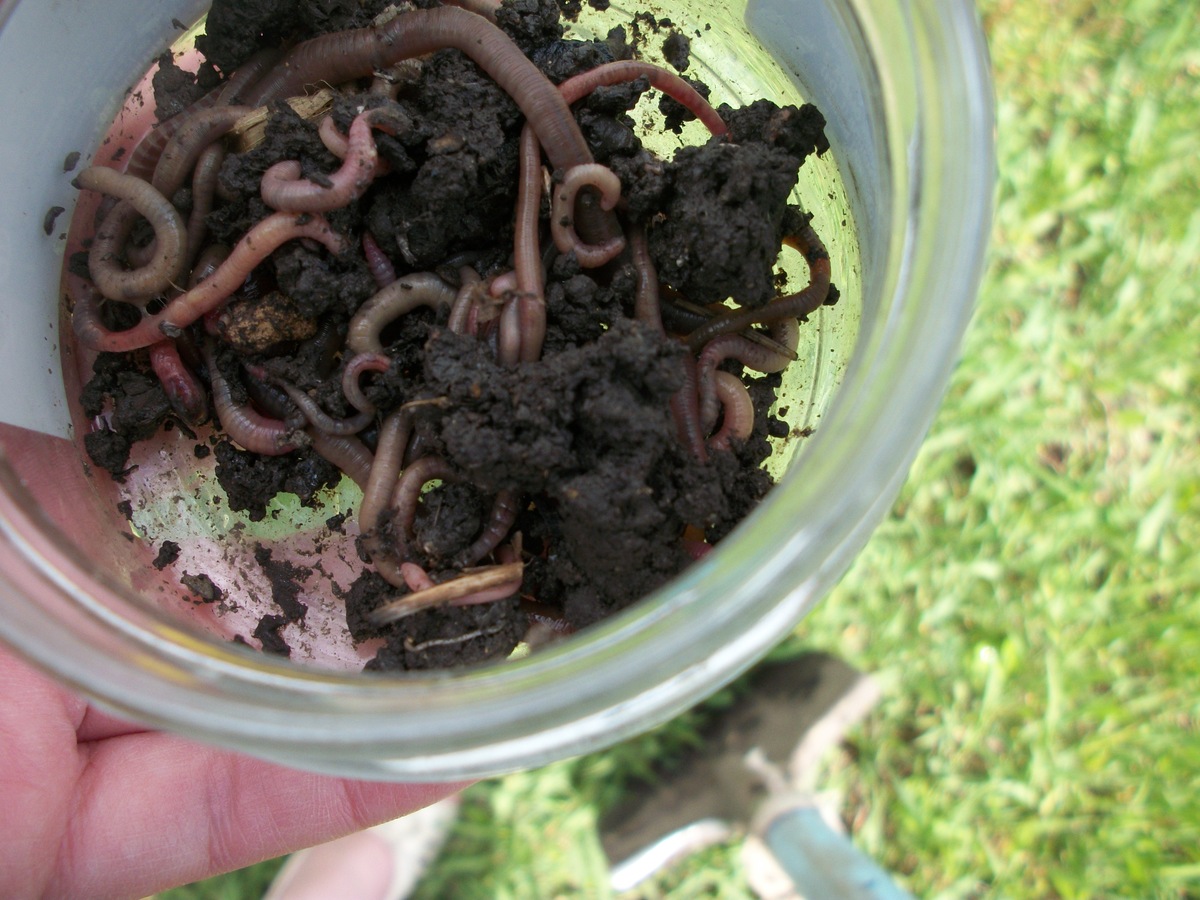White worms are commonly found in pot plants, hence the name pot worms. These worms offer more benefits to your compost than they do damage. However, it’s advisable to control their population before they become a nuisance.
So, you’ve stumbled upon white worms in your compost bin. Don’t panic.
These critters aren’t as nasty as you’d think, and your compost can benefit from their presence.
Still, if you want to do something about them, this article will guide you through the proper steps.
Read on.
Table of Contents
White Worms in Compost: Is This Good or Bad?
Your first encounter with white worms, also called pot worms, can give you goosebumps because these critters come in large groups, similar to infestation. Still, white worms don’t mean that your compost is ruined or something about your pile is off.
These worms offer more benefits to your compost than they do damage. However, it’s advisable to control their population before they become a nuisance.
Why Do I Have White Worms in My Compost?
There are many reasons why you would have white worms in your compost, including:
- Your compost has too much moisture.
- The ph levels in your compost are low.
- Presence of fermenting food waste in your bin.
- Excess green material in your compost bin.
Catching Pot Worms in a Worm Farm
The simplest method of catching pot worms uses bread and milk to attract these grubs and get them out of your compost bin.
You must also make other changes inside your bin to rid it of these pot worms entirely, including:
- Add carbon-rich material to your bin to soak up excess moisture.
- Remove extra fermenting food scraps from your bin.
- Throw in crushed eggshells or agricultural lime to neutralize your compost’s ph levels.
- Aerate your soil and cut the water supply for a while.
- Cut down your nitrogen-rich material supply to your compost.
Types of Critters in Your Worm Bin
Red worms are a standard part of any worm compost system because they’re harmless critters that improve your compost quality.
Still, many other larger grubs infest your worm bin, and you should know them to identify the good from the bad.
1. Potworms
These bugs are small white worms commonly found in pot plants hence the name pot worms. You can also refer to pot worms by their scientific name Enchytraeids which relates them to red worms.
These white worms multiply faster in moist acidic conditions and can cause a massive infestation of your worm bin within weeks.
Pot worms are harmless to plants and help boost the composting process. Still, you must control their numbers lest you have to deal with an entire compost infestation.
2. Fruit Flies
Your worm bin provides the perfect breeding environment for fruit flies due to moist conditions.
While they pose no threats to your worms, compost, or plants, these flies are a nuisance because they reproduce too fast. Each adult fruit fly can lay about 500 eggs in their life cycle, which only lasts a week.
Fruit flies lay eggs on the surfaces of fruits and vegetable scraps and peels, obtaining nutrients from them till their end.
3. Soldier Flies
Soldier flies look and behave like wasps but vary in color from black, blue, or green to those with black and yellow patterns on their bodies. Yet, adult flies lack a mouth or sting that could harm humans.
The black soldier fly larvae, scientifically known as Hermetia illucens, feed on rotting material in your compost bin and are great for your worm farm. Not only are they harmless to the worms, but they also consume different organic matter, thus reducing food competition.
Unlike the common house fly, these unique grubs don’t spread any diseases and produce an odor that discourages other pests from infesting your compost.
4. Springtails
Springtails are white wingless critters that feed on bacteria, mold, fungi, and decaying plant matter, making them harmless to the worms in your worm farm. However, they compete for food with your worms and can even eat dead or weak wrigglers.
Since they also multiply faster than earthworms, springtails can chase the worms into hiding once they’re overpopulated.
5. House Flies
You should worry more about house flies in your compost than any other grub because they indicate improper foods like oily food scraps, meat, or the presence of feces. These flies also spread diseases in their environment and are a massive nuisance to farmers.
Adult flies lay eggs that hatch into larvae. The maggots feed on decaying material and can also attract other pests to your compost bin.
Is It Ok to Have Maggots in Compost?
For sure. Maggots are harmless and help your compost more than you’d think. These grubs feed on decaying organic matter, which boosts the decomposition process.
They also enrich your compost with droppings; when they die, their bodies become natural fertilizer for your plants.
Yet, you must control the maggot population before it becomes an infestation that ruins your worm bin. These maggots can attract pests to your bin that feed on them and leave feces behind, which attract house flies.
Similarly, an overpopulation of maggots leads to the exploitation of nutrients in your compost bin.

Maggots in Compost: What Causes Them?
Black soldier flies and house flies lay eggs that hatch into maggots. However, the soldier flies are attracted to moist conditions and abundant food waste in your pile, while house flies only come when you add feces or greasy food scraps to your bin.
Increasing green materials in your compost bin like grass clippings and vegetable matter crank the moisture levels up, attracting black soldier flies to the pile.
Always ensure a balanced brown to green ratio, adding more mulch to your bin like sawdust and dry leaves.
Tips on Preventing Maggots
The best way or removing maggots from your compost heap is to prevent their infestation in the first place.
Try these tips:
- Ensure you have a balanced ratio of brown to green materials in your compost bin.
- Stop adding grass clippings in considerable amounts to your pile.
- Install a window screen to cover up any holes in your compost bin.
- Never add meat, meat products, dairy, or fat to your compost.
- Use a sealed compost bin like the modern indoor composters from stores like Amazon.
Tips on Ridding Your Worm Bin of Maggots
If you already have maggots in your compost bin, try these tips to eliminate them.
- Add more carbon-rich materials to your compost.
- Add lime to your compost pile. (Still, lime juice increases acidity levels and attracts potwroms to your bin)
- Pour vinegar on your compost. (Vinegar also lowers your compost’s ph levels)
- Throw them to the birds as feed. (Maggots have high protein levels)
Benefits of Grubs in Your Compost
Grubs, although yucky, actually have several benefits for your compost pile, including:
1. Speed Up Decomposition
Worm composting ensures the organic material in your bin breaks down faster than it would without grubs.
Also, these critters introduce more microorganisms to your pile, thus, increasing the composting surface area and reducing the time taken.
2. Enrich Your Compost With Droppings
Earthworms, for example, feed on the organic material in your compost bin and leave behind worm castings used as natural fertilizers for plants.
This worm poo also boosts your compost’s nutrient levels, thus, increasing the composting microbes needed for decomposition.
Similarly, vermicomposting requires a large worm population which introduces new microorganisms to your compost heap whenever these critters die and become organic matter.
3. Aerate Your Compost
Wiggly creatures like red worms in your compost bin move by burrowing through the composting materials without damaging their soft bodies. Such movement creates air pockets that provide breathing room for the microbes in your compost, speeding up the composting process.
So, if you notice any delays in your composting cycle, you can add common grubs like red wigglers to help speed things up.
4. Prevents Odors and Infestations
Critters other than worms like black soldier fly larvae feed on manure in your compost, reducing the chances of a smelly pile.
Also, since animal manure carries diseases in the first place, these critters mitigate the chances of an infestation by breaking it down into compost for your plants.
Compost Grubs Can Be an Eye Sore, Too. Here’s Why
Grubs have a significant role to play in your compost bin. Still, these critters become a nightmare once they establish a home in your compost and overpopulate themselves.
Here’s how grubs can be an eye sore:
1. They Exploit Your Compost’s Nutrients
Maggots, for example, consume nutrients by breaking down organic matter in your compost to survive.
Yet, their short life cycle translates to a fast reproduction rate which demands an increase in nutrients from your compost.
This need forces maggots to take up more of the food waste’s nutritional value that would’ve come in handy for your soil or plants.
2. They Can Kill Plants Too
Fungus gnats are common grubs that infest your soil, compost, or potting mix and whose larvae feed on the organic material in your pile.
Their larvae can also gnaw on your plant roots when you add compost with fungus gnats infestation to your garden.

